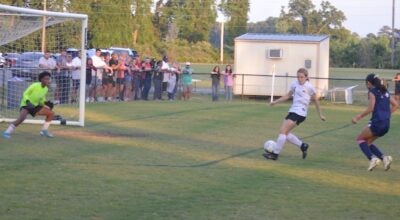WakaWaka to aid decimated Nepal
Published 11:56 am Friday, May 8, 2015
If you’re an outdoorsman concerned with the emergency equipment necessary to have on hand in case of a disaster, you’ve probably heard about a piece of gear called a WakaWaka. Next to a good sturdy cell phone or a sharp knife, the WakaWaka is the most useful thing to have available when the “stuff-hits-the-fan.”
The company that makes this little piece of gear has been very aware of the life-saving possibilities it offers to anyone who is in need of adequate lighting at night and emergency power for a cell phone or other electrically operated gear. The company is making a very special offer to anyone who feels the need buy a personal WakaWaka and would like to send another one (free of charge) to the Nepalese, who were withered by one of the strongest earthquakes of the century. In other words, for every WakaWaka you buy, the company will send a free one to the needy people of Nepal.
I bought one of these WakaWakas over a year ago after having read reports of how this cellphone sized, solar-powered item would supply emergency lighting and power to some electronic devices. It seemed to be a good addition to my car, boat and “bug-out” bag. With a cell phone, this unit, a water purification straw, some matches and other fire making material, a good knife and a tarp, you have nearly everything you might need to spend an unexpected night in the woods.
Thankfully I haven’t been in a true emergency need (yet), but I have tried the WakaWaka and by golly it works as it claims to do. It uses the power generated by the sun to charge a small battery inside the WakaWaka, which, in turn, offers very adequate light and several charges to my iPhone.
Each WakaWaka unit is a little larger than the average cell phone. One side of each unit is made up of a black solar panel that, when exposed to sunlight (even on a cloudy day), supplies an internal battery. There are two LED lights on the unit that operate on three different levels of brightness. A standard USB port on one side of the unit enables the operator to connect to various electronic devices (such as a cell phone) and power-up the battery of these other units.
When I’m out on the water or in the woods, I carry not only the WakaWaka unit, but also an additional back-up battery to store electricity, one the WakaWaka can supply. Of course, the outdoorsman will need a USB cable designed to connect other devices as well.
For a backpacker or kayak camper who formerly needed to lug along batteries (or a gas lantern plus fuel) for their nighttime power, the WakaWaka is ideal.
The WakaWaka unfolds and, on the brightest lighting level, supplies about three hours of light strong enough to get by on a dark night. The lower light levels are very adequate to enjoy other nighttime activities for even more hours.
According to Maurits Groen, the President of WakaWaka: “After receiving urgent pleas from emergency relief organizations, WakaWaka will donate 2000 solar lights to emergency relief efforts in Nepal and surrounding regions. WakaWaka is monitoring the situation with emergency relief organizations on the ground and assessing the needs for additional solar lights and chargers.”
“WakaWaka (‘shine bright’ in Swahili) is a Netherlands based social enterprise on a mission to end extreme energy poverty — develops, manufactures and markets high-tech low-cost solar powered lights and chargers. In less than two years, WakaWaka has helped bring light and power to more than 650,000 people. However, over 1.2 billion people still have no access to electricity and are forced to depend on toxic and dangerous kerosene. 16,000 people are burned each day by kerosene lamps and each year, indoor pollution kills more people than AIDS and malaria combined. Replacing kerosene lamps with WakaWakas has a critical, large-scale effect on health, safety, education, community and economic development, especially in remote regions, disaster-struck, or war-torn areas. For every WakaWaka retail purchase, one is given to a family in need. In the U.S., WakaWaka works exclusively with the International Rescue Committee.
“To best respond to urgent requests WakaWaka is receiving from emergency relief organizations, we are redirecting all of the solar lights raised through our ‘buy one, give one’ offer to Nepal,” said Maurits Groen, Founder and CEO of WakaWaka. “Large parts of the country have been plunged into darkness and WakaWakas can help.
“Even prior to the earthquake, 66% of rural Nepal didn’t have access to electricity. Access to light and power is critical for survivors as well as the emergency response teams who need light sources after dark to deal with the crisis. WakaWakas help emergency response workers continue their life saving work when the sun goes down, and enable families to safely move about after dark and stay connected with their loved ones.
“WakaWaka solar lights and chargers provide immediate assistance as well as long-term relief by enabling the survivors to see after dark and to charge their phones to connect with family and loved ones.”
The WakaWaka Foundation is also collecting donations to send solar lights and chargers to emergency relief efforts in Nepal and surrounding regions.
Prospective WacaWaca buyers should find the WakaWaka for sale at Amazon, Best Buy and the Apple Store. The solar powered WacaWaca light only sells for about $39 and the combination light power supply sells for about $79.





